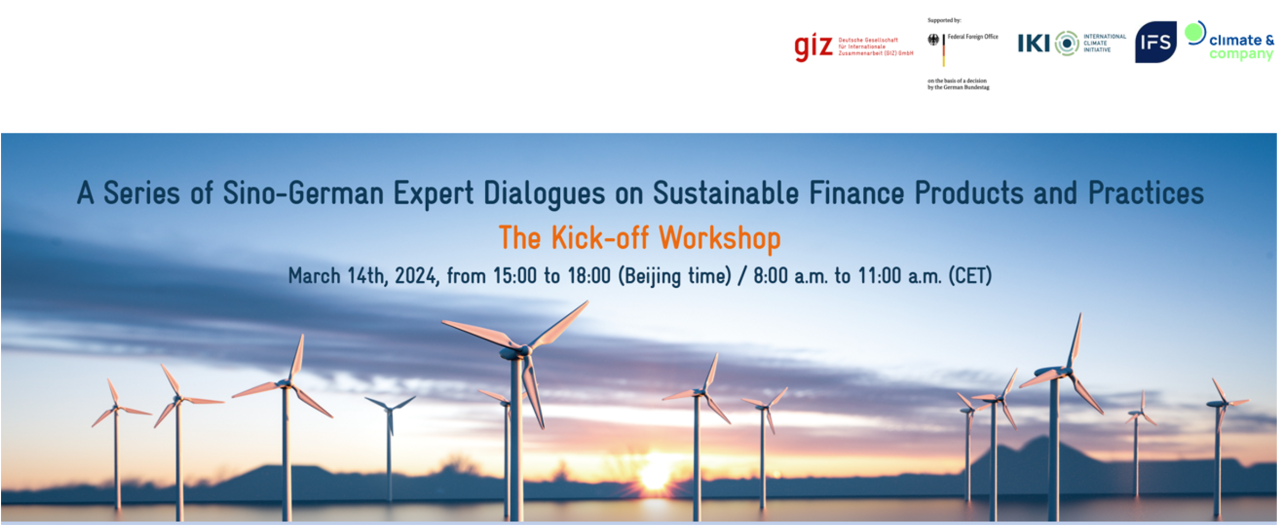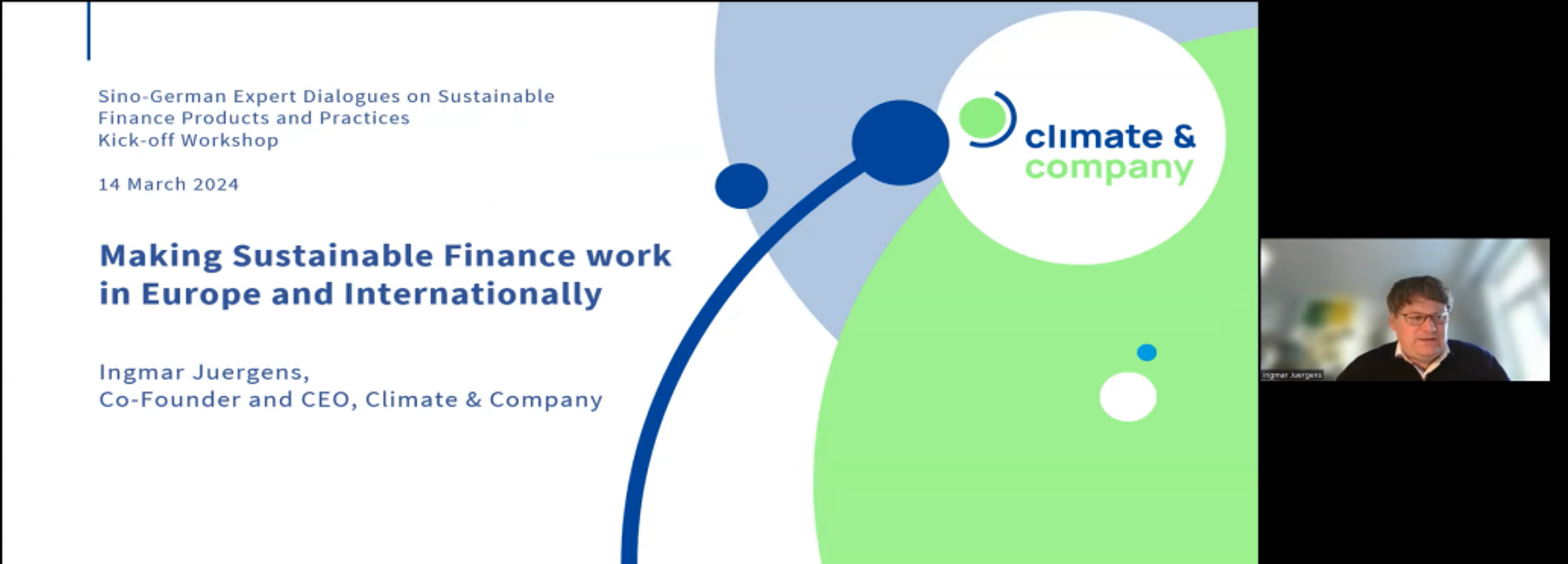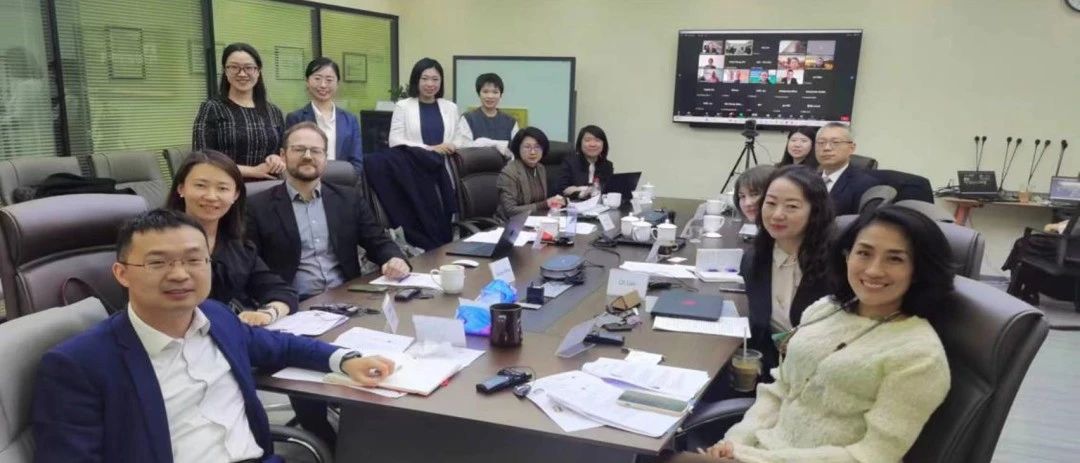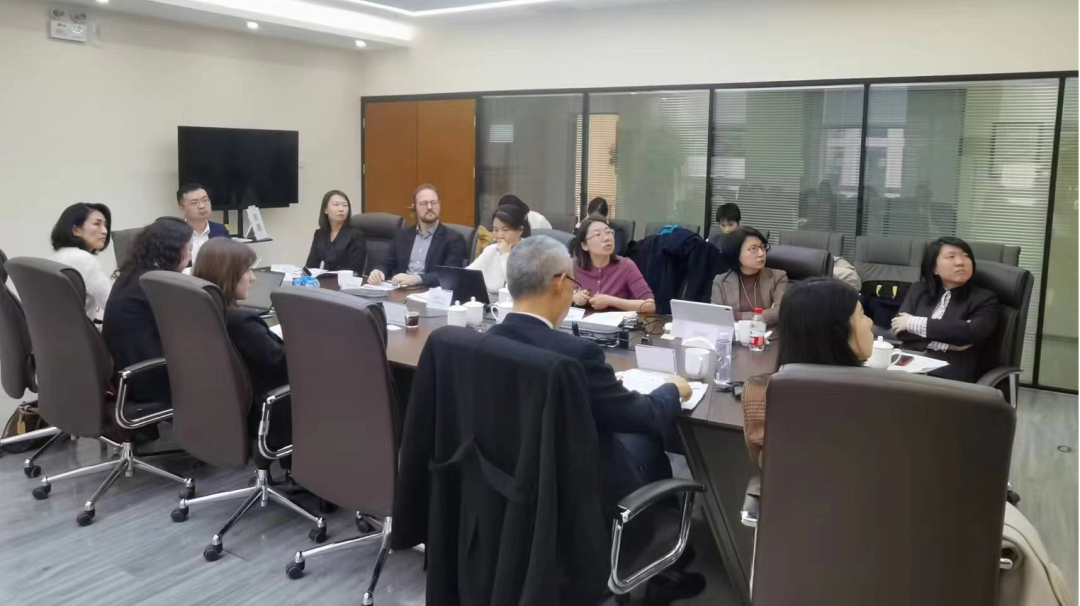Sino-German Expert Dialogues on Sustainable Finance Products and Practices Kick-off Workshop

The Kick-off workshop of the Sino-German Expert Dialogues on Sustainable Finance Products and Practices, jointly hosted by Deutsche Gesellschaft für Internationale Zusammenarbeit GmbH (GIZ), Institute of Finance and Sustainability (IFS), and Climate & Company, convened in a hybrid format at the IFS Office in Beijing on March 14th, 2024.
The workshop marks the commencement of the "Sino-German Cooperation on Climate Change - Climate Partnership" expert dialogue series on Sustainable Finance Products and Practices. As part of the project framework, one of the key strategies involves establishing a Sino-German expert exchange platform, with a focus on promoting climate finance and investment. This platform is envisioned as a long-term technical exchange and information sharing network that will convene key experts in sustainable and climate finance from both nations as well as the EU, facilitating ongoing collaboration and peer-to-peer learning to raise climate ambition amongst the key stakeholders from the financial sector in their decarbonization pathways.
This event has brought together nearly twenty experts from regulatory agencies, financial institutions, universities, global advocacy organizations, and think tanks. They've shared valuable insights and the latest developments in sustainable finance, offering perspectives from China, Germany, the European Union, and around the world, using both online and offline channels.
Representatives from key Chinese and German stakeholders delivered welcome remarks. They all expressed congratulations on the opening of the meeting and emphasized the importance of sustainable finance development, highlighting that strengthening international cooperation and exchange is a crucial step forward.
Ding Hui, Head of the General Office, Department of Climate Change, Ministry of Ecology and Environment (MEE) pointed out that China is rapidly developing its sustainable finance sector, with the aim of directing more funds towards combating climate change and promoting green transitions. The Sino-Germany Expert Dialogue workshop serves as an important platform for strengthening exchanges between China and Germany, expected to attract further investments into climate change and enhance practical cooperation in climate investment and sustainable finance.
Hannah Westphal at Economic Division, Embassy of the Federal Republic of Germany in Beijing highlighted that both the European Union and Germany have taken ambitious steps in implementing sustainable finance strategies, which will be discussed during these workshops along with other up-to-date policy initiatives, financial products, and industry practices from EU, Germany, and China, thereby fostering more interactive and in-depth Sino-German expert exchanges.
Martin Hofmann,Head of Cluster at Climate Energy, Environment and Biodiversity, GIZ East Asia emphasized that Sino-German kickoff workshop, aims to support China in achieving its 2030 and 2060 targets and implementing its Nationally Determined Contributions (NDCs) and the policies from the 14th Five-Year Plan; In collaboration with IFS and Climate Company, our series workshops will facilitate exchanges between German, European, and Chinese experts on different asset classes of sustainable finance products.
This kick-off workshop was moderated by Cheng Lin, Director of Center for International Collaborations, IFS. Ma Jun, President of IFS, and Ingmar Jürgens, Co-Founder and CEO of Climate & Company, delivered captivating keynote speeches, shedding light on the remarkable progress in sustainable finance in both China and Germany, as well as across Europe.
Ma Jun,President of IFS, emphasized China's significant progress in green finance over the past decade, highlighted by the establishment of a Green Finance Task Force ten years ago and the subsequent implementation of Green Finance Guidelines in 2016, resulting in the world's largest green lending and green bond markets. Despite these achievements, challenges persist, including the need for nationwide implementation of transition taxonomy, early-stage development of risk analysis tools, and weak ESG products within the asset management industry. Internationally, Dr. Ma outlined five key initiatives, including the G20 Sustainable Finance Working Group, NGFS, IPSF Common Ground Taxonomy working group, endorsement of ISSB by the G20, and the launch of CASI by IFS, aimed at serving 100,000 clients in emerging markets by 2030.

Ingmar Jürgens,Co-Founder and CEO, Climate & Company, reflected on the evolution of environmental consciousness since the Stockholm Environment Conference and highlighted Germany's leadership in renewable energy, followed by China's emergence as a global economic powerhouse and renewable energy leader. He focused on the development progress and achievements of the European sustainable finance policy framework, including the pivotal policy measures of the European Green Deal in facilitating the economic and societal transition of the European Union, as well as the gradual establishment and improvement of sustainable finance taxonomy standards and disclosure requirements. At the same time, he highlighted the challenges facing the development of sustainable finance, including policy consistency, data availability, and the lack of market practices. He emphasized three priorities for the way forward: the central role of transparency in building trust in sustainable finance; the importance of scaling up market practice (“getting started”) and pilot projects to demonstrate sustainable finance can work in practice (identifying best practice, pain points and solutions); and co-operation and mutual learning across nations and stakeholder groups, to further international alignment.

Following the keynote addresses, three panel discussions delved into various facets of the market. The discussions covered three topics, including: Overall Market Development and Dynamics; Green and Sustainable Finance Taxonomy; Sustainability Disclosure Practices in the EU, China, and Germany.
Session 1: Overall Market Development and Dynamics:
Yang Ping, Head of Division for Green Finance at Research Bureau, PBOC, highlighted that since 2016, China has been developing a green financial system, alongside innovative products. Also, adhering to market-oriented principles, China guides financial resources towards green and low-carbon sectors, encourages financial institutions' investment in such activities through policy incentives, and manages liquidity. To ensure transparency, China emphasizes environmental information disclosure from several entities, introduces third-party green certification, implements special fund account management for green bonds, and mandates continuous disclosure on the funds.
Chen Yaqin, Deputy General Manager at Green Finance Department, Industrial Bank introduced progress made by Industrial Bank. To better serve its customers' needs for green and low-carbon transition, Industrial Bank has established an institute and created a dual-carbon management platform offering one-stop solutions. By collaborating with local governments on initiatives, industrial bank is also working closely with the NDRC to explore approach to carbon peak across cities with different industrial structures and economic levels.
Sheryl Loh, Senior Project Manager at Frankfurt School of Finance and Management shared the European Union's strategy for sustainable finance development. The EU's sustainable finance regulatory framework mandates disclosure, promoting practices through policies and legislation. She introduced the completion of the "Sino-German Transition Finance Joint Research" by Frankfurt School and the CAS Institutes of Science and Development, supported by GIZ. This research will establish a foundation for defining Sino-German collaboration in transition finance in the future. Additionally, discussions were held on emerging trends such as financial support for biodiversity and sustainable impact investing, which present challenges for financial institutions but also offer valuable opportunities.
Xiong Wei, Greater China Corporate Coverage COO at Deutsche Bank introduced that Deutsche Bank has incorporated ESG principles into their business strategy by building internal competencies, setting up dedicated offices for ESG matters, quantifying transition targets, and assessing clients' decarbonization strategies. Deutsche Bank is committed to releasing annual progress reports on their decarbonization efforts and helping cross-border businesses navigate varying regulatory landscapes on ESG compliance. For 2024, Deutsche Bank anticipates an increased focus on issues like defining transition finance, managing shipping costs due to carbon pricing, and aligning German Original Equipment Manufacturers (OEMs) in China with net-zero goals.
session 2: Green and Sustainable Finance Taxonomy:
Jiang Rui, Deputy General Manager of the RMB Department at the China Foreign Exchange Trade System (CFETS), highlighted the milestone achievement of the Common Ground Taxonomy (CGT), jointly completed by China and Europe. She emphasized that the CGT, as a significant milestone, represents the collaborative efforts of numerous participating institutions, further advancing the establishment of green finance standards. Labeling work led by CFETS, and multiple assessment agencies reduces misjudgment rates and ensures compliance with CGT standards, thereby promoting investment in Chinese green bonds by overseas institutions. To date, 221 green bonds totaling nearly 300 billion RMB have been labeled, comprising 22% of China's total green bonds, with additional efforts made to promote product applications and disseminate CGT bond information through financial platforms.
Dr. Astrid Matthey, Team Lead of Sustainable Finance and Environmental Valuation at the German Environment Agency and Co-Rapporteur of the Technical Working Group of the EU Platform Sustainable Finance, highlighted the establishment of the IPSF taxonomy group, initiated by the People's Bank of China, which jointly developed the CGT. This comprehensive taxonomy encompasses 72 economic activities contributing significantly to climate change mitigation. Despite considerable progress, China faces challenges, such as low participation from overseas institutions due to inconsistent definitions of green standards and limited mutual recognition. Matthey emphasized the importance of expanding the CGT's scope, incorporating sustainable finance standards from other jurisdictions, and refining methodologies. Furthermore, market promotion initiatives should focus on developing financial products for both secondary and primary markets, regularly updating CGT bond lists, and considering asset management products based on CGT criteria. The ultimate goal is to enhance awareness and acceptance of the CGT through continued taxonomy expansion, promotion of CGT-labeled bonds, and stakeholder engagement efforts.
Sebastian Sommer, Senior Consultant for Group Development, Corporate Strategy and Sustainability at KfW, underscored the pivotal role of the EU Taxonomy within a broader spectrum of reforms, notably the Corporate Sustainability Reporting Directive (CSRD), which significantly reshapes mandatory sustainability disclosure across corporate and financial sectors. Since 2022, KfW has actively integrated key performance indicators (KPIs) from the sustainability taxonomy, such as the Green Asset Ratio (GAR), while vigilantly monitoring regulatory shifts impacting procedural frameworks. Current challenges persist in CSRD implementation and enhancing the quality of sustainability reports, including data scarcity within banks and hurdles in applying the EU Taxonomy to product design and market practices. Sommer also noted the disproportionate emphasis of the EU Taxonomy on environmental factors, potentially affecting companies' economic performance. Addressing these challenges requires enhancing departmental agility, fostering broader collaboration and exchange, and furnishing strategic decision-makers with actionable insights.
Session 3: Sustainability Disclosure Practices in the EU, China, and Germany:
Bella Cheng, Capacity Building Specialist at the IFRS Foundation, shared insights into the establishment of the International Sustainability Standards Board (ISSB) to meet market demand for useful, comparable information. The ISSB's four-pillar strategy supports adoption and use of its standards globally, with interest shown by jurisdictions like Australia, Hong Kong, the UK, Brazil, and African countries. Cheng underscored the importance of collaboration with entities like CDP, which has integrated ISSB requirements into their questionnaire to facilitate interoperability. Additionally, she pointed out that ISSB will lead emerging economies' IFRS strategy, while fostering stakeholder engagement and capacity-building activities.
Bronte Klein, Chief of Staff and head of GRI Networks at GRI, highlighted that as a significant institution setting non-financial information disclosure standards in the global public market, GRI advocates for capacity building. She elucidated the differences between the GRI and IFRS standards. Despite market confusion, she clarified the existence of four main global standards: GRI, ISSB, ESRS, and the SEC's climate standard.
Sabrina Zhang, IFS distinguished researcher; Formerly APAC Head of ESG integration, S&P Global Market Intelligence, stated in sustainability reporting and financing disclosures are rapidly evolving in China. She highlighted recent consultations between mainland China's stock exchanges on ESG disclosure standards, affecting approximately 4500 companies. In Europe, specific industries face stringent ESG reporting requirements. Despite challenges posed by various disclosure standards, ESG information is crucial for attracting capital, as ESG-integrated products demonstrate strong performance over time. She also addressed challenges such as transition risk and supply chain management, advocating for standardized frameworks like CDP's Science-Based Targets to aid companies in facilitating the transition to a low-carbon economy.
Frank Schiemann, Professor and Associate Member of Sustainable Finance Research Platform, University of Bamberg, underscored the importance of transparency in sustainable finance discussions, highlighting its benefits for investors, regulatory bodies, and companies. The discussion delved into different sustainability disclosure standards and frameworks, debating their mandatory versus voluntary nature, applicability to different-sized firms, and preferred disclosure methods. Research findings suggested that voluntary sustainability information can enhance market efficiency and sustainability performance, although initial financial impacts may occur for unprepared companies. Looking ahead, anticipation surrounds the impact of IFRS S1 and S2 on the ESG landscape, with a focus on enhancing market integrity and investor confidence through standardized disclosure frameworks.
Finally, Ms. Qi Lan, Co-Team Lead, Sector Team of Climate; Project Director, Sustainable Finance Project, GIZ East Asia made a concluding speech. She announced that GIZ, IFS, and Climate & Company will launch a series of Sino-German and Sino-European expert seminars in 2024 focusing on different asset categories such as debt financing instruments, equity investments, insurance and reinsurance, and other disaster risk financial tools. She invited all experts to continue supporting this dialogue platform and expressed hope that the expertise and influence of Sino-German and Sino-European sustainable finance would expand continuously. Furthermore, she hopes that bilateral expert dialogues can be transformed into specific climate actions, scaling up sustainable finance and encouraging cross-border capital flow between China and Germany/Europe consistent with climate goals.
The seminar covered key issues in the main areas of sustainable finance, benefiting more than forty attendees profoundly. Looking towards a sustainable future, this dialogue once again confirmed the firm commitment of China, Germany, and even Europe to promote cooperation and exchange in sustainable finance globally.




